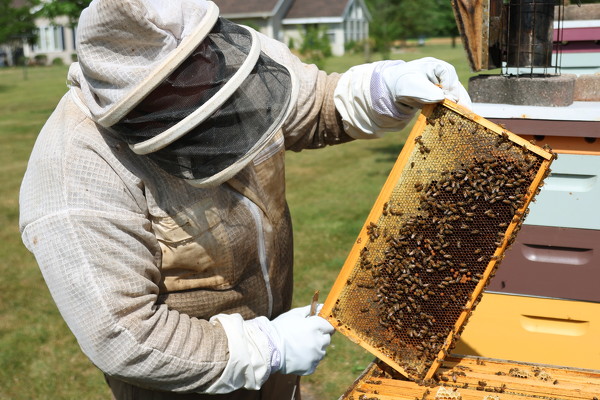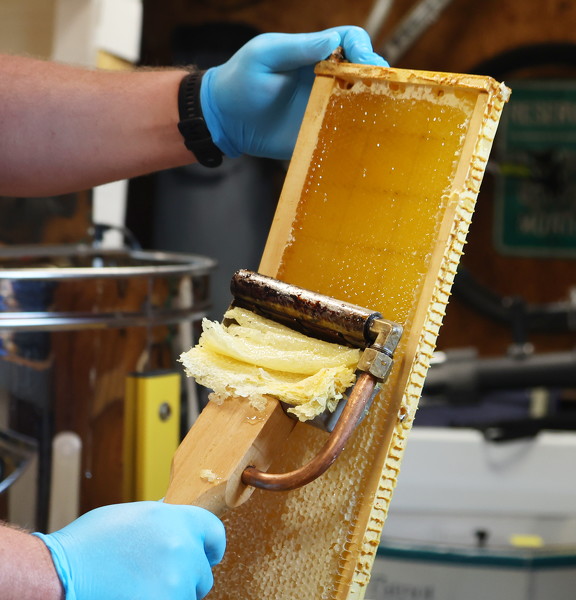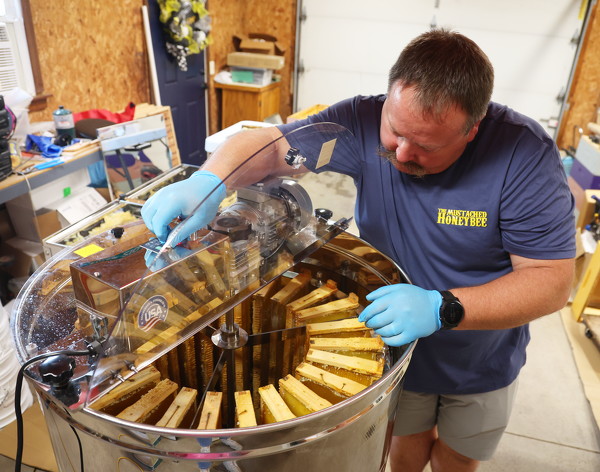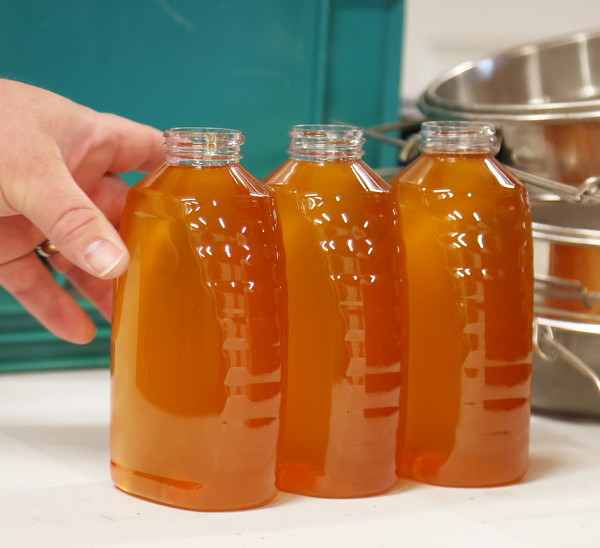
Ty Shelby, owner of The Mustached Honeybee and president of the Greater Grand Lake Beekeepers Association, pulls out a frame from a hive at his residence in Celina.
CELINA - Summer is a time of agricultural abundance, and local honeybees are working around the clock to produce honey known for its flavor, healing properties and protection against allergies.
Ty Shelby, owner of The Mustached Honeybee in Celina and president of the Greater Grand Lake Beekeepers Association (GGLBA), said his farm is home to as many as 70,000 honeybees. Named after Shelby's signature mustache, the farm sells various types of honey at about eight to 10 different vendor shows and markets a year. The bees produce more than 2,000 pounds of honey annually.
Shelby said he took an interest in beekeeping about a half decade ago and began by selling traditional honey is three sizes. However, Shelby has vastly expanded his offerings to include infused honey and home-made honey spreads.
Shelby offers customers regular honey and honey infused with different flavors, such as sour grape, sour cherry, vanilla, orange, peppermint, lemon, watermelon, jalapeño, habanero and more.
"People either use honey, or they don't," he said. "If they have a flavor that they like, they might give it a try."
In addition to its sweet flavor, honey is said to hold many healing properties.
According to study from National Institute of Health, honey consumed at a high dose daily was found to improve the symptoms of allergic rhinitis. Shelby said his daughter Ella found relief from allergies herself after ingesting honey daily.
Using local honey as a defense against allergy symptoms stems from the idea that if a person ingests local pollens that bring them discomfort, they can build up an immunity against them.
"My daughter has terrible allergies," he said. "Last year, I said, 'I'm going to save you some spring time honey.' She started taking it in February, and then in May we're driving down the road and she goes, 'Look Dad, the pollen is off the chart, and I can still breathe.'"

Shelby uses a heated tool to uncap a honey frame.
Shelby said he stumbled upon beekeeping about six years ago after he and his family wanted to move to the countryside.
"We wanted to move to the country and we wanted to get chickens," he said. "We still have chickens, sometimes we have a garden and the orchard is not my concern anymore. The bees have become my passion."
He began with two hives in his first year and eventually grew to five before losing them all to pests and extreme cold temperatures.
Now, Shelby has about 50 hives spread across six locations. Just like any form of agriculture, becoming a seasoned beekeeper takes time. He said it takes about three years to become a bee keeper.
In addition to honey and honey-based products, Shelby also sells bees and is often a mentor to beginners.
"When people call and they need bees, you become a mentor to them," he said.
Shelby sells what is called a nucleus colony. According to the apiarist.org, a nucleus colony is a fully functional colony of honey bees on a smaller scale than a full colony. It contains stores, adult bees, brood in all stages and a queen.
Shelby considers himself a steward of bees.
"I provide them with stable housing," he said. "Here, I planted two acres of wildflowers, because if I had cattle, I would provide them with hay. I try to provide them with a place they can forage."
After he accumulated honey and learned the ropes of beekeeping, he then developed a market to sell his honey products.
"There's a sign out front, but I don't live on a busy highway," he said. "I always say, 'There's plenty of market out there, but you have to go out and make your own market."

Shelby places a frame into a honey extractor. The machine uses centrifugal force to fling honey onto the sides. Honey runs down to the bottom and into a filtered bucket.
He acknowledged experiencing growing pains at first, but said he found his footing with help from other local vendors. At the start of his beekeeping journey, Shelby found mentors and friendship in the GGLBA community. Now president of the club, he enjoys sharing his successes and failures with his fellow club members, which total at about 100 people.
"As it takes about three years to become a beekeeper, you think, 'Well I know it all.' But it's continued education because everyone else is like a sponge and they're going out and soaking up what information they can," he said. "Then we get together and share, and you become a mentor."
He recommended anyone interested in the craft to attend a GGLBA meeting.
"(If you're hesitant around bees) get a hold of someone who has bees, and see if you can check it out with them," he said. "I've got extra suits, so if someone really wanted to see what it was about I could suit them up, put them in a yard and kind of ease them in."
GGLBA holds meetings at 7 p.m. on the second Tuesday of each month at St. Marys Public Library. It also offers a beginner beekeeping class that serves as a recruitment tool for the club.
For information on how to purchase Shelby's honey, call The Mustached Honeybee at 419-236-3734.

Two-pound bottles of honey wait to be labeled and sold to customers.